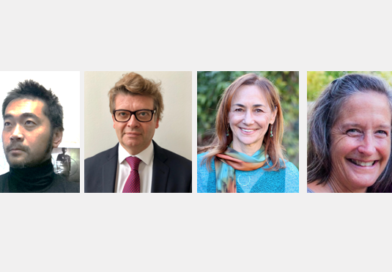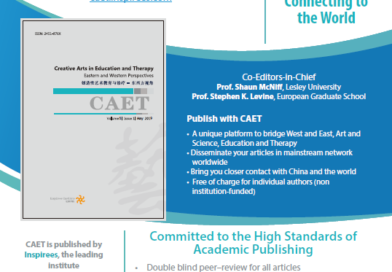Current Issue
Foreword
We are struck, post-pandemic, by multiple wars raging in Europe, the Middle East, and other parts of the world. The extreme stress, trauma, and horror of these events, unfolding mostly to innocent people, on all sides, cannot go unmentioned. Now more than ever, our ability to listen to what our bodies tell us through drama, dance, music, or the movement of a pencil across paper is needed. We hope, in a small way, that those people in power and influence across the world will take heed of the suggestions in our articles in this Winter 2023 edition. The body needs to be heard and listened to and acted upon to create positive peaceful and productive futures. Read more
Artistic Workshops with Patients of a Psychiatric Day Hospital in France
Authors: Ivan Magrin-Chagnolleau
This article delineates a study conducted within a psychiatric day hospital in France, adhering to the principles of institutional psychotherapy and therapeutic clubs that originated from the anti-psychiatric movement of the 1970s. The study specifically explores two activities within this framework: a music club and a video club. The primary objective of each club was to establish activities involving both the patients and the care staff to dissolve the boundaries between them. Additionally, these activities aimed to engage both patients and care staff in the conceptualization and execution processes, thereby fostering a collaborative approach within the psychiatric care setting. Read More
Ink Talks: Processing Compassion Fatigue through Culturally Relevant Arts-Making
Author: Ying (Ingrid) Wang
This paper explores the power of the arts and the spiritual support of one’s own culture in helping an immigrant arts therapist process professional compassion fatigue. Through autoethnographic narrative and arts-based inquiry, I intend to dive into the emotional distress arising from this immigrant therapist’s experience of compassion fatigue in a creative way. Read more
What are the Affordances of Arts-Based Workshops with Refugee Women and Girls?
Authors: Sarah Skyrme, Susan Hogan
This article explores the particular benefits of arts-based interventions with refugee women and girls and the potentialities for enhancing social justice. This truncated review of literature makes reference to arts-based communication, notions of female empowerment, symbolism and metaphor, and expressions of identity and agency and then moves on to explore a number of primarily participatory arts-based interventions with women and girl refugees, looking at the particular affordances yielded. Read more
The Experience of Social Rejection: Developmental Transformations and a Multimodal Art Response Model as Applied to Art-based Research
Authors: Dina Fried, Gideon Zehavi
In this preliminary study, we propose an expressive and interactive research method using a developmental transformations (DvT) model and a multimodal art response as applied to an art-based research (ABR) design, specifically relating to the experience of social rejection. We explored three research questions: Can the experience of social rejection be understood through playful interactions in DvT play? How does playing with the experience of rejection vary in solo play, play with an object, and play with a partner—i.e., otherness? How do researchers’ responses to participants enrich this understanding? Read more
Bridge to the Silence—Integrative Dramatherapy with Selective Mutism
Author: Sarah Bilodeau
This article is presented as a clinical case study in research and the arts that explores the journey of a 7-year-old girl with selective mutism, and her growth through an integrative intervention that combined dramatherapy, systemic, behavioral, and attachment-informed approaches. Sessions took place in Shanghai, China. Gorla et al. (2017) [Without words. Different children in different contexts (Trans.). A.G. Editions] and Perednik (2016) [The selective mutism treatment guide: Manuals for parents, teachers, and therapists: Still waters run deep. Oaklands] propose that the significant others of a person with selective mutism can become therapeutic agents of change, and through this lens, the child’s family, peers, and school staff became involved. Read more
A Pro in Intimacy: The Use of GoPro Camera within Art-Based Research
Author: Michal Lev
This article presents the primacy of video in research. It integrates notes from art-based research that used a GoPro video camera to explore intimate experience, with demonstrating applications of video for documentation, artistic inquiry, systematic processing, analysis, and presentation of results. The article addresses the natural linkage between artistic expression both in-person and online and its relation to intimacy. Read more
Playback Theater as Pedagogy: A Qualitative Research Study on the Use of PT in Education toward the Self-development of Future Teachers
Authors: Liwen Ma, Wen-Lung Chang, Clive Holmwood, Joseph L. Subbiondo
Self-development is an important basis for the professional development of teachers and future teachers. In this study, future teachers are graduate students whose majors are school counseling and mental health education. The performance of playback theater (PT) in the classroom has become an integral part of teaching, especially for teaching integral drama-based pedagogy (IDBP). Using qualitative research methods, researchers found that PT enables future teachers to deeply develop and experience “respect” and “empathy.” Read more
Artist spotlight: Interview with Pamela Silver: A Lifetime of Painting in Colors
Author: Vivien Marcow Speiser
Pamela Silver is a South African-born artist who lived as a child in Rhodesia (now Zimbabwe). She completed her BA at the University of Cape Town, SA, and Goldsmith College in the UK and continued her studies in the arts in the USA and Israel. She immigrated to Israel in 1973, where she currently lives. She considers herself to be an intuitive artist creating artwork in watercolors, prints, and oils. Pamela studied at Art Students’ League, New York, from 1982 to 1983, and is a member of the Israel Society of Painters and Sculptors since 1985. She has exhibited in over 90 exhibitions worldwide, including 25 solo exhibitions. Read more
Book Review: Music Psychotherapy and Anxiety: Social, Community, and Clinical Contexts
Author: Annie Heiderscheit
Music Psychotherapy and Anxiety: Social, Community, and Clinical Contexts is a comprehensive text providing a holistic exploration of anxiety, the sociocultural factors impacting it, and how music and music therapy can be instrumental in addressing and transforming its debilitating effects. The text is divided into four sections, and it provides the reader with a detailed overview of theoretical dimensions, physiological dimensions, clinical-cultural dimensions, and applied dimensions. The format of the text provides guideposts for the reader as they strive to develop a fuller and deeper understanding of the impact and nuanced aspects of living with and experiencing anxiety. Read more
Recent Issues
Feature Articles
Call for Submission
Click here CAET Winter Edition 2024 (10.2) call-for-paper. The deadline for the submission is September 1, 2024. We look forward to your contributions. Hoping in hope that all contributions to this journal may support us all in times of angst, fear, rage and confusion.
Editorial Board
News and Events

A warm welcome to CAET editorial board members
CAET is glad to announce its expanding editorial board with a warm welcome to Professor James Miller, Dr. Laury Rappaport, KK

A warm welcome to CAET editorial board members
CAET is glad to announce its expanding editorial board with a warm welcome to Ilene A. Serlin and Ronald P.M.H. Lay.

CAET and Inspirees invited on BAAT
We are glad to announce that CAET and Inspirees have been invited by British Association of Art Therapy to attend

‘Harmony in Diversity’ – 2019 International Conference on Art Therapy
Master Confucius once recorded in the Doctrine of the Mean (Zhongyong), ‘All things are nourished together without their injuring one

